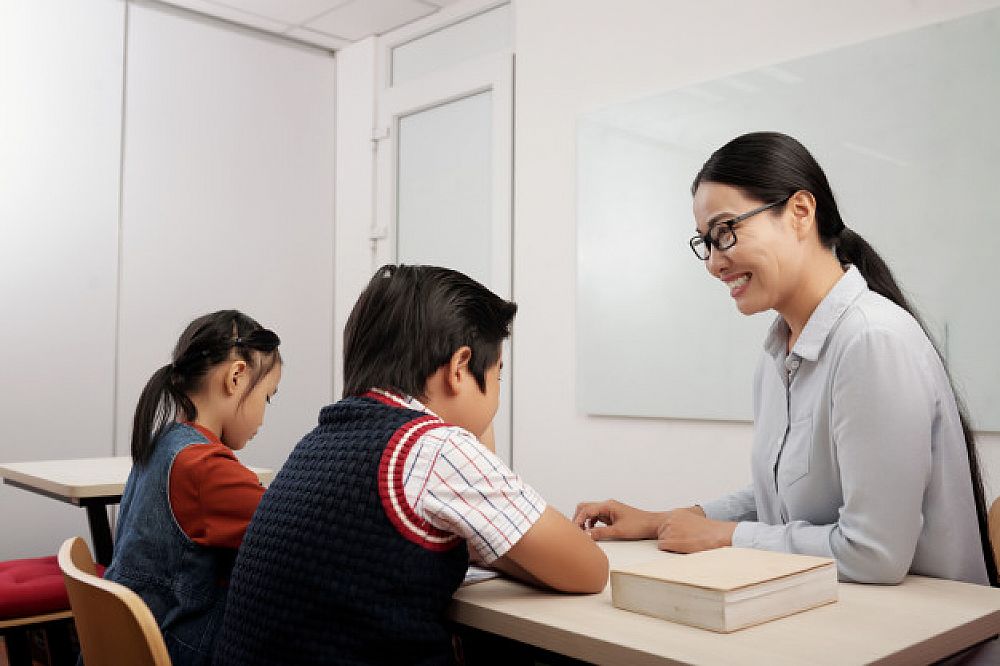Teaching Bigger Groups vs. Individual ESL Learners

One of the main differences between teaching groups and individual students is the lesson plan.
Several factors need to be considered when planning a lesson for a single student:
- Properly graded material
- Topics relevant to the student’s interests
- Student’s will to participate in conversations
- Student’s motivation to learn English
- Student’s age
The aforementioned factors should be taken into account even when teaching groups but in one-to-one lessons they are crucial. Considering that the whole lesson is dedicated to one individual, material covered should be graded to his/her exact level to achieve the best result, giving the teacher freedom to make the lessons challenging to stimulate further self-study.
This post was written by our TEFL certification graduate Ivana P. Please note that this blog post might not necessarily represent the beliefs or opinions of ITTT.
Teaching One-to-One
Unlike teaching groups, where topics might be relevant and interesting to some but not all students, during one-to-one lessons all topics are chosen to serve student’s interests and satisfy his/her needs. Time is an important factor in lesson planning for a single student, therefore student’s will to communicate makes a huge difference when considering activities to be covered. As the teacher focuses all the attention on one person, it is expected that this person’s speaking time is maximized so his fluency would logically be developed much faster than the fluency of a group student. The teacher should use the knowledge gained of the student’s motivation to learn English to make certain language points more appealing throughout the course.
Finally, the student’s age should be considered in creating an appropriate lesson plan as it is known that children have shorter attention span than adults, therefore much more material should be prepared to cover the possible loss of interest in certain topics. Adult individual learners are far more ready to adopt knowledge than a child or a teenage individual student because they usually engage in learning English for career or travel purposes so the fact of gaining something valuable out of learning is stimulating enough. Children and teenagers rarely decide themselves take an individual or a group course of English, instead, they follow their parents' desires so there is a possible lack of motivation teachers need to take into consideration and deal with.

Also Read: How To Start Your Own ESL Teaching Service
From a Learner’s Perspective
From a student’s point of view, taking individual lessons has many advantages, time being the primary one. If a student’s goal is to improve his/her speaking abilities quickly, he/she will choose this kind of learning that focuses all the attention on the student’s needs and maximizes his/her speaking time. Some students are introverts and do not feel comfortable enough to speak in groups in front of other people, but prefer having a teacher as a reference and support, so they choose one-to-one lessons.
What do Teachers Think
From the teacher’s perspective, and my personal teaching experience, it is much easier to prepare and carry out a lesson with a single student, especially if the student becomes loyal for many years. A special kind of friendly-professional relationship, based on trust, is formed and nurtured resulting in mutual satisfaction, a student’s progress, and an honest, generous recommendation.
Some of the funniest, most exciting, entertaining and fulfilling moments in my eleven-year-old teaching career occurred while teaching groups. I truly believe there is no greater satisfaction in the professional life of an educator than seeing happy and satisfied students with their learning goals met.
Also Read: How long does a TEFL course take?
Lesson Plan for Group Teaching
There are plenty of thoughts to consider when preparing a lesson plan for a group class. If we are dealing with children, visual aids, interesting worksheets, songs, games, and other creative activities should be included in the lesson plan to make the class more enjoyable and stimulating. Children adopt a new language more quickly and easily than adults, especially if the whole “package” is interesting enough. Teachers that work with children and teenagers should possess certain personal qualities that bring out the best in their group work. They should be friendly, skillful, eager, creative, polite and most importantly patient with children.
Classes with adult students need to be well prepared and carried out with several important points in mind:
- Size of the class
- Students’ level
- Group structure
- Group dynamics
Large groups tend to be very noisy if there is no authority in the teacher’s personality. The teacher should divide the large class into several groups and appoint group leaders to handle the instructions given. Groups can cooperate or complete depending on the task at hand.

Also Read: 5 Tips on How to Impress Business Clients as a Business English Teacher
Students Abilities
Students’ knowledge level should ideally be the same or quite similar, although that is not always the case. If the level gap is bigger than the one allowing the regular course of action, than the teacher should be really experienced and resourceful to combine different techniques of dealing with that difficulty such as: handing out different tasks to weaker and stronger students or pairing the stronger with the weaker ones in role-play activities in order to overcome the difficult situation.
Students Peculiarities
Teachers should always have in mind the structure of the group they are teaching. Cultural sensitivity is necessary for the smooth running of the class. As far as the group dynamics are concerned, it is important to spot the relations between students and have the ones who get along well work together more often. Even the possibility of conflict should be avoided at all costs. Students that are reluctant to speak tend to slow down group progress, so they should be gradually included in pair-work activities and not pushed to speak.
Do you want to teach English abroad? Take a TEFL course!
In conclusion, there are clear differences between teaching a single student and a group but a well-prepared teacher with a flexible lesson plan can handle all kinds of situations that might occur.
Apply now & get certified to teach english abroad!
Speak with an ITTT advisor today to put together your personal plan for teaching English abroad.
Send us an email or call us toll-free at 1-800-490-0531 to speak with an ITTT advisor today.
Related Articles:
- Teaching English In Russia - The Salary and Budget Guide
- Advantages of Teaching Adult Students and Implications on Teacher’s Methodology
- The 8 Best Countries in Asia for Teaching English Abroad
- Online or In-Class - Which TEFL Course Should You Take?
- How To Write The Perfect ESL Lesson Plan
- Getting Student Placement Right - The Best Desk Arrangements for EFL Students



